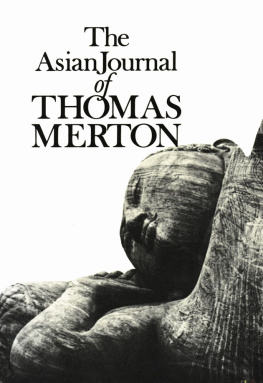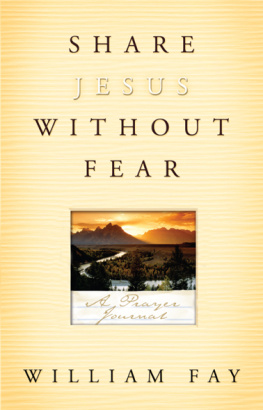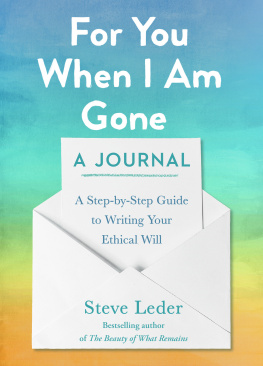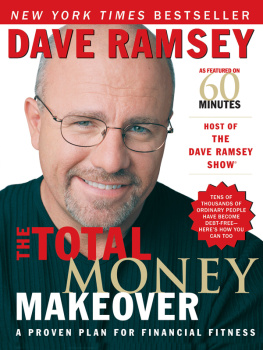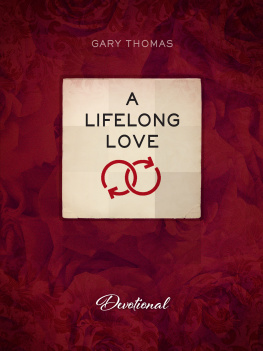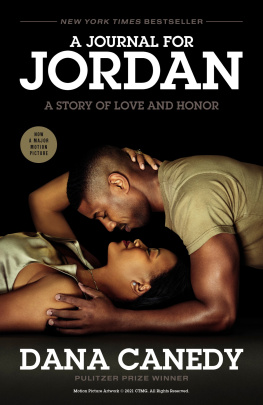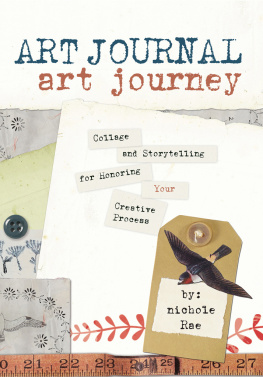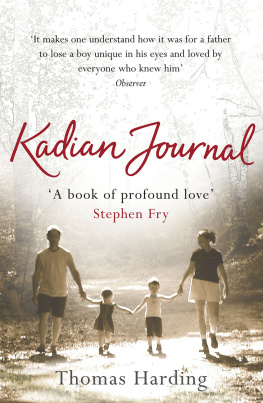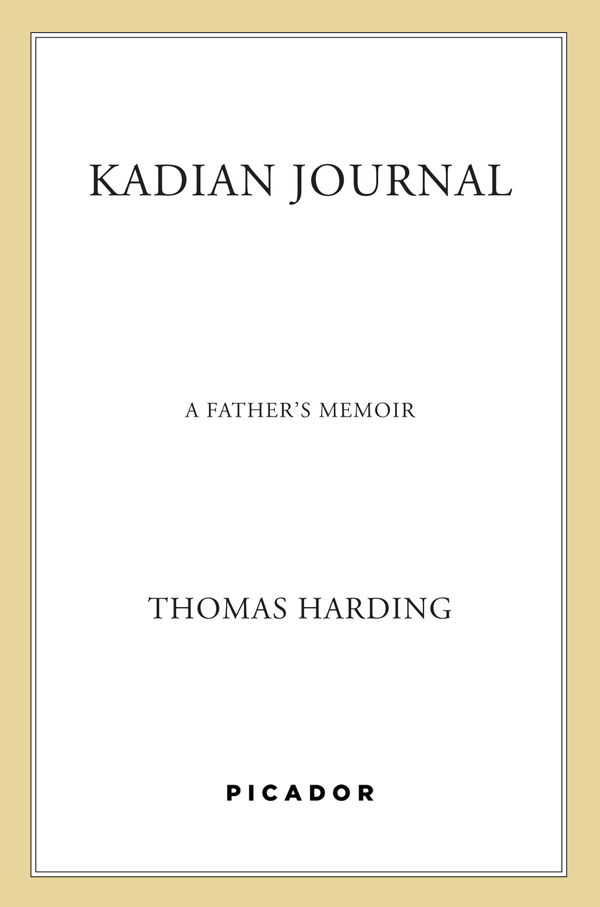Contents
Guide

The author and publisher have provided this e-book to you for your personal use only. You may not make this e-book publicly available in any way. Copyright infringement is against the law. If you believe the copy of this e-book you are reading infringes on the authors copyright, please notify the publisher at: us.macmillanusa.com/piracy.
For Deb and Sam
The wintry garden lies unchanged,
The brook into the stream runs on,
But the deep-eyed Boy is gone.
Threnody
Ralph Waldo Emerson
It is not growing like a tree
In bulk, doth make Man better be;
Or standing long an oak, three hundred year,
To fall a log at last, dry, bald, and sere:
A lily of a day
Is fairer far in May,
Although it fall and die that night
It was the plant and flower of Light
In small proportions we just beauties see;
And in short measures life may perfect be.
The Noble Nature
Ben Jonson
25 July 2012
We are cycling up a narrow country lane to the ridge at the top of the Downs. It is early evening. There is not a cloud in the sky. The air is soft and warm after a day of baking sun.
There are six of us: my twenty-one-year-old nephew Taylor, my sister Amanda and her friend Anne-Claire, my fourteen-year-old son Kadian, his school friend Rori, and me.
As Kadian climbs the hill I call from behind, encouraging him to practise his turning signals. He puts his right arm out and the bike wobbles in the same direction. You need to lean to the left when you signal right, I shout from behind. Try it. He does, and it is marginally better. When I tell him to do it again, he grunts in disgust and, pressing hard on his pedals, pulls away from me up the hill.
We are staying at my parents house in Mildenhall, a village just outside Marlborough in Wiltshire. Our plan is to cycle ten miles west, to my uncle and aunts thatched cottage, for a family dinner. The journey will take us up and across the Marlborough Downs, a chain of grassland chalk hills that separates the county of Oxfordshire in the north from Wiltshire in the south. Along its top runs an ancient footpath, known as the Ridgeway, and it is this that we intend to follow.
We continue our way up the lane and the vista opens. There is a field filled with golden wheat on our left. Another speckled with grazing sheep and Neolithic stones. Below us a grassy slope drops away to fields etched with terraces. The ringed mounds of ancient hill forts can be seen in the distance. The sun, sitting low in the sky, splashes amber light across the landscape.
It is so beautiful here, Kadian says as I pull up to him. Its so beautiful, he repeats with a dreamy smile.
We wait for the others to catch up then head off the lane onto a stony track that descends gently down to a large stack of hay bales. The trail ends abruptly, which is strange. I look at my map, trying to figure out where we have gone wrong. Kadian cycles behind the hay and calls out, Its over here, the footpath is over here.
Kadian goes first, and the rest of us follow. Soon we are riding along a narrow path through a tunnel of trees. Kadian, still in front, calls back, Its muddy, its muddy, in a not very believable but still funny northern accent.
The path opens into a broader track. Its a little gravelly, steeper. The gap between myself and Kadian widens. I notice this, the information sliding though my mind without traction as I grasp my brakes to slow my descent.
Hes suddenly way ahead of me. A hundred feet perhaps. He must have gathered speed. And then theres a flash of a white van, moving fast from left to right, at the bottom of the slope. It shouldnt be there. And the van hits Kadian. Driving him away from view, away from me.
Moments later Im at the road. I drop my bike to the ground. Im screaming before I see him. Hes lying face down on the side of the road, near the white line. His head is tilted to the left; there is a small pool of blood by his mouth. I cant see his bike. He is still. Absolutely still. He doesnt look like Kadian any more. He looks vacant. He looks like he is six or seven years old. But what strikes me the most, more than the blood, or the lack of movement, are his eyes. His pupils are dilated unnaturally wide. I know hes gone. I know he is dead. I know that I have lost my son. My Kadian.
This is real. This is happening. I cant believe it. Im crouching a few feet from him. Wailing. My head in my hands. And wailing. No. No. No. I dont want to touch him. I dont want to cradle him in my arms. I want to roll back time. I am both in my body, rocking, howling, and high above, looking down on this dreadful scene, feeling oddly sorry for the father who has just lost his son, suddenly, tragically.
I realise that this is the A4, the road running from Marlborough in the east to Avebury in the west. But there is no traffic. Everything has stopped. A man in a dark green RAF flight suit runs up and squats down by Kadian. I dont know where he has come from. Could an ambulance have arrived already? Who would have called them? My brain cannot make sense of this collapsed world. Is it OK if I turn him over? he asks. How am I meant to know? I realise it wont make a difference, but the mans question makes me wonder, is there hope? I nod. Cradling his head, he gently pulls one side of Kadians body over so that he is staring at the sky. He takes out a phone. Hes talking to the emergency services.
These images flick through my brain. I notice that I am not holding him. I notice that I am not trying to resuscitate him. I notice that I know theres no point. My brain is observing, detached, helplessly trying to catch up.
At some point I remove his black bicycle helmet, thinking that the strap may reduce the airflow to his brain. I am not sure when I do this. Is it before the man in the green flight suit arrives, or after? Is it before Kadian is turned over? I think it probably is, but I am not sure. Time has ended. There is only this moment, this spot.
My sister arrives. She squats down and holds my head, tight.
Hes dead, I say to her. Hes dead.
We dont know that yet, she says. Dont give up hope.
I think for the first time about my wife, Debora, of having to tell her. I start wailing again. No, no, no.
Its been about two minutes since the accident.
Yet, curiously, part of my brain still has hope. I call my uncle he is a doctor, he might be able to help. My aunt picks up the phone. I tell her what has happened. She does not understand that it is Kadian. But the panic in my voice registers, and she scrambles to find my uncle.
* * *
I need to call Deb, I say to my sister.
Wait, she says. Lets see what happens.
No. I need to call her now. She needs to know.
Its as though I am standing at the edge of a well. I am out of my mind, all is quiet, nothing is moving. I lean towards the deep hole.
Something clicks in my head, and I realise that I have to make sure there is someone with Deb when I tell her what has happened. Deb is away in America. She is the CEO of a bicycle business. I call her office in Washington DC.
I ask to be put through to the general manager, Gin.
Hi, Gin. Wheres Deb?
Shes gone out. To the post office, I think, says Gin. She is calm.
Gin, Kadian has been in a very bad accident. I need you to be there when I tell Deb. Can you find her? Ill call you back in a few minutes.
She agrees, and says she will have Nate there as well, the young guy who runs the head office.


